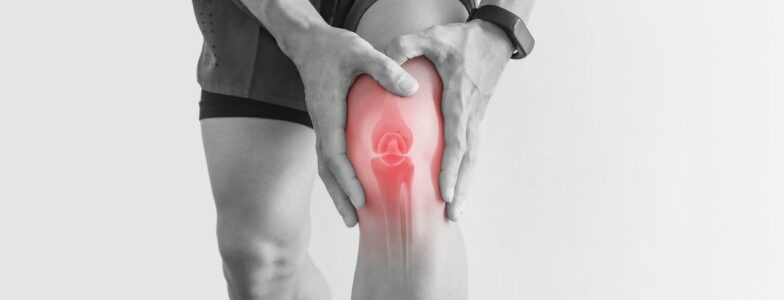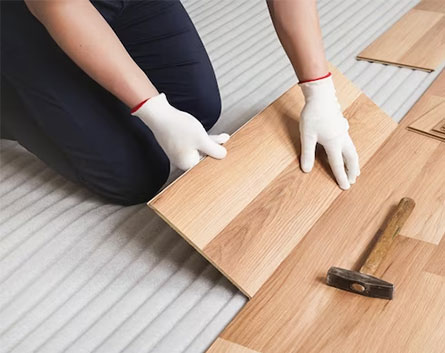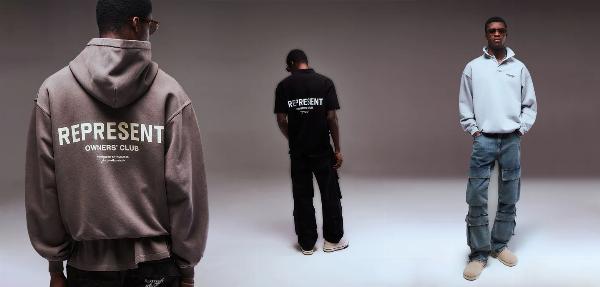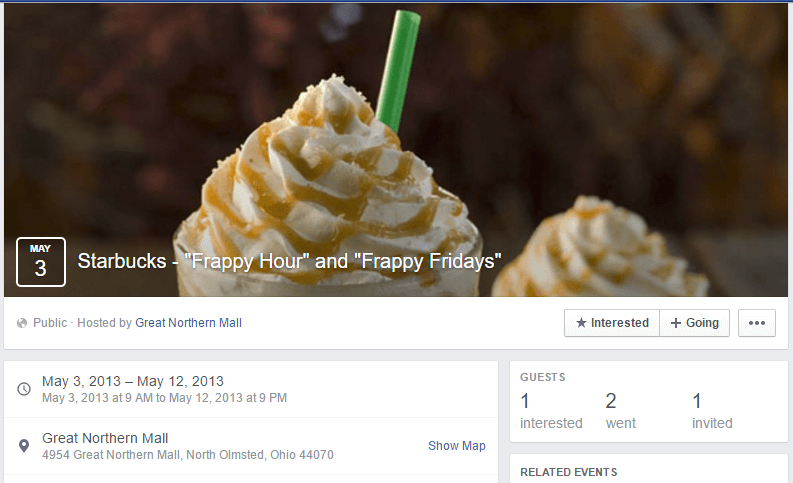'He felt joy and he shared joy': Phoenix music scene loses a legendary character
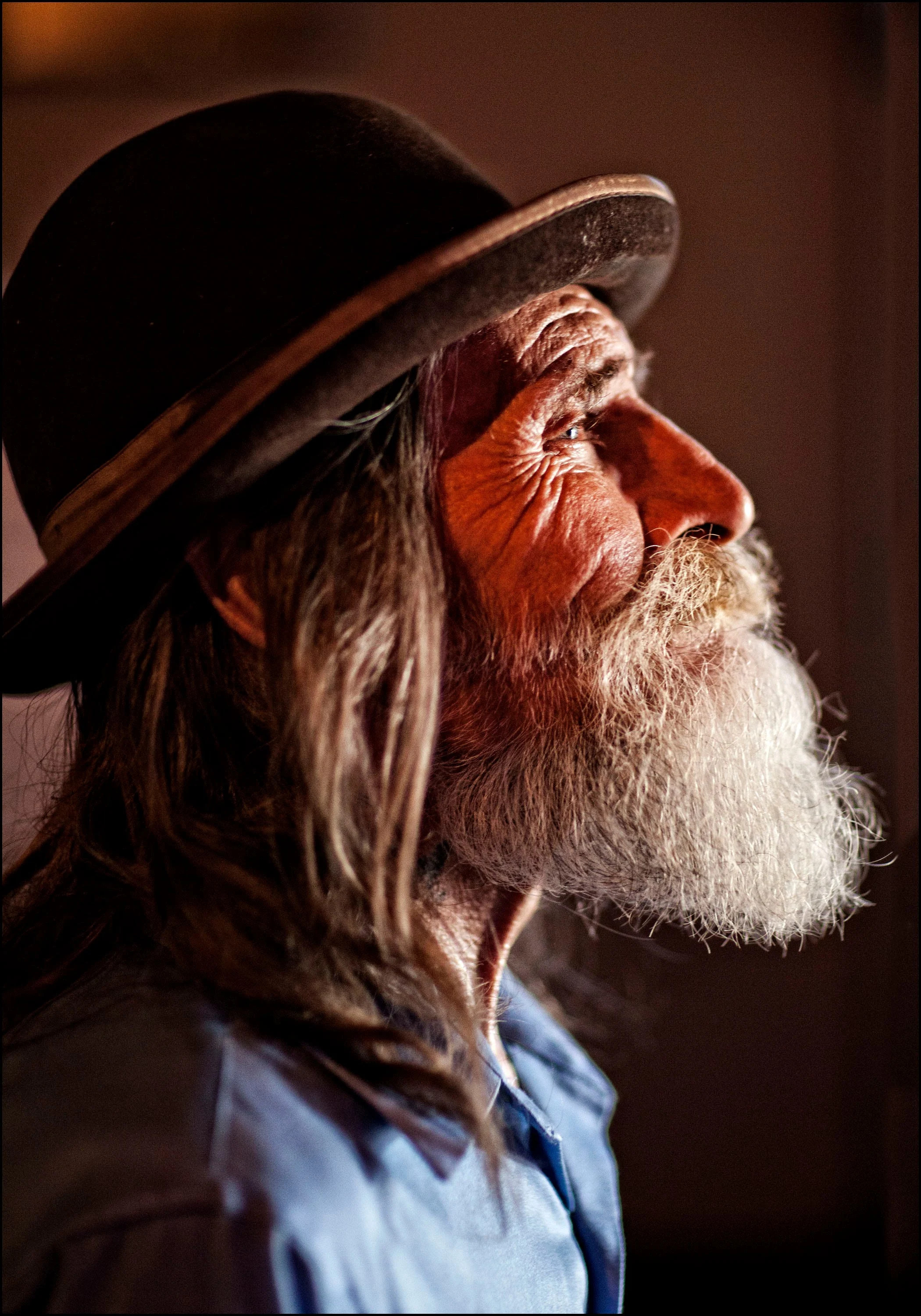
When the Rhythm Room shared the news on social media that Larry Dee had died, the comments quickly filled with heartfelt testimonials to a regular remembered as “our beloved, kind-hearted, blues-loving, larger-than-life personality who made his home at the Rhythm Room.”
Dee died on Monday, July 21, 2025, of lung cancer. He was 74.
“And he looked like he might be older than that,” Bob Corritore, who owns the Rhythm Room, recalls.
AdvertisementAdvertisement#_R_113ckr8lb2mav5ubsddbH1_ iframe AdvertisementAdvertisement#_R_213ckr8lb2mav5ubsddbH1_ iframe“I mean, here's this guy. He had this world-worn face, filled with wrinkles and age and smile lines, and he never forgot to have fun. Maybe sometimes a little too much fun. The blues just gave him so much joy. He never had a lot of wealth or anything like that. But he never lost that childlike joy that we all want to regain at some point. And around Larry Dee, you could still have that.”
Larry Dee was part of the Rhythm Room 'personality infrastructure'
Dee was “part of the personality infrastructure” at the Rhythm Room, Corritore says, and had been since the day the club opened for business in 1991 at 1019 E. Indian School Road in Phoenix.
“He became part of the Rhythm Room family from Day One,” Corritore says.
“He showed up and never left, and we just loved him. He was a true character. He could have been playing himself in any movie, an old Western or a movie that had any kind of fullness to it. I just always felt he added so much character to the Rhythm Room.”
AdvertisementAdvertisement#_R_12jckr8lb2mav5ubsddbH1_ iframe AdvertisementAdvertisement#_R_22jckr8lb2mav5ubsddbH1_ iframeMonaLisa Watkins was part of the Rhythm Room family for 17 years, starting as a cocktail waitress and working her way up to general manager.
“There were many times when I was there during the day, when nobody else is there, doing the beer order, doing the books or whatever,” Watkins recalls.
“I'd get a knock on the back door and he'd have some crazy thing worked up, like 'This is 3 on Your Side up here to do an expose.' I'd open the door and he'd give me a big old hug. He'd say, 'I'm just here to check in on you and see how you're doing.' I'd say, 'I'm doing all right. Can I get you anything?' And his phrase was, always, 'I'll take a Coke to go with that smile.”
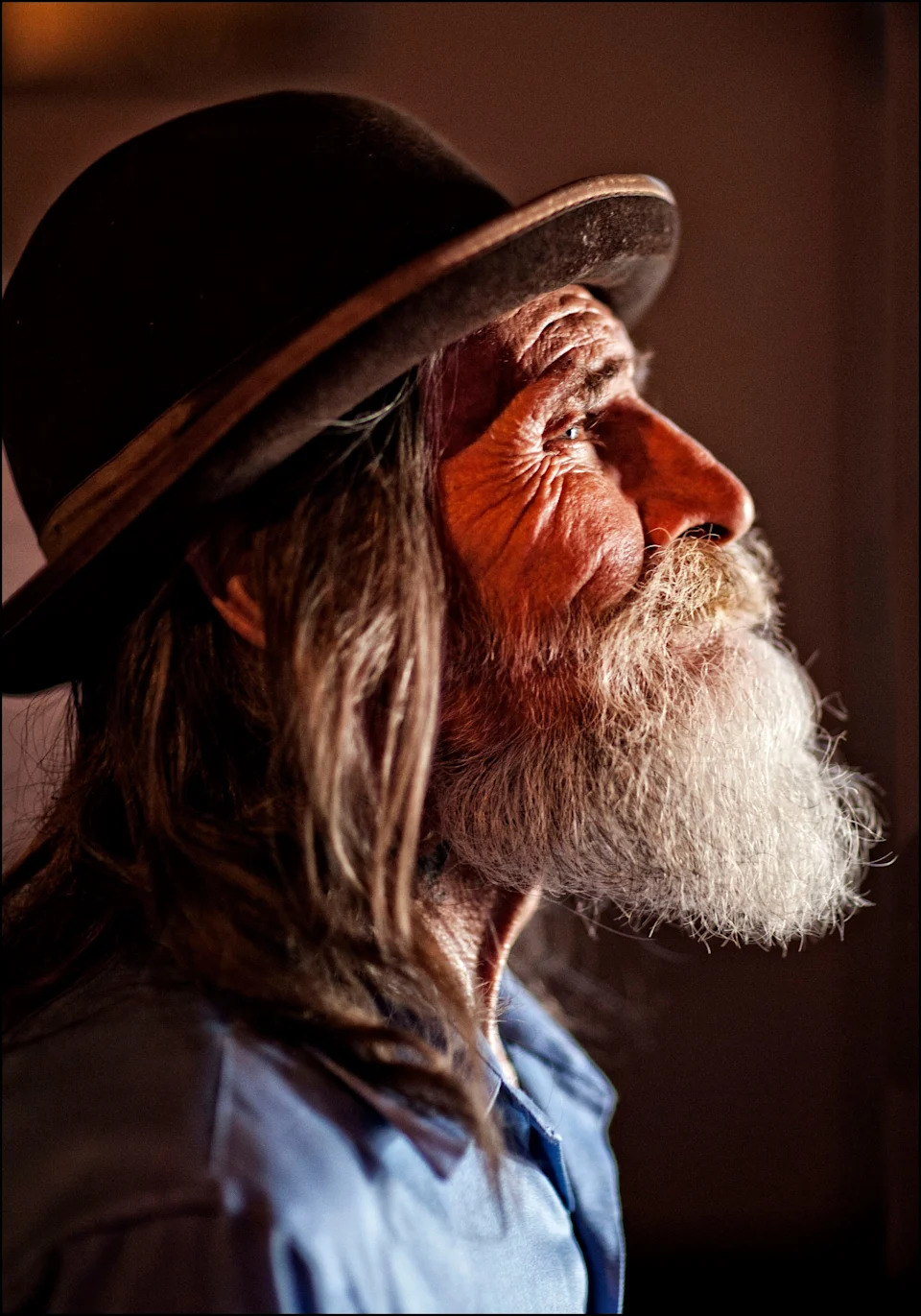 Larry Dee, a Rhythm Room regular who was part of the family
Larry Dee, a Rhythm Room regular who was part of the familyLarry Dee was a kind soul who 'felt joy and he shared joy'
Dee was “a kind soul, nice to everybody,” Corritore recalls. “Just being there as a regular part of the family, he was loved by everybody. He was just a bearer of goodwill. He felt joy and he shared joy. I don't think he had a lot to give, but he gave everything he could, you know?”
AdvertisementAdvertisement#_R_14bckr8lb2mav5ubsddbH1_ iframe AdvertisementAdvertisement#_R_24bckr8lb2mav5ubsddbH1_ iframeWatkins says Dee didn't have a mean bone in his body.
“He'd stop in and see me, and he'd always end it with, 'Well, I'm on my lunch break, so I gotta go,’” she says. “And I don't think he worked. He did a lot of stuff for people, but it wasn't like he had a steady job or anything. He'd ride off on his bike saying, 'I'm gonna keep an eye on the place for you.' Just a wonderful man.”
The uninitiated didn’t always know exactly what to make of Dee.
“He might have been a little bit rough around the edges for some people that don't want to accept people that are a little rough around the edges,” Corritore says. “But, you know, the Rhythm Room is a home for everybody. We like people with character. If you're a misfit, you fit right in here.”
AdvertisementAdvertisement#_R_15rckr8lb2mav5ubsddbH1_ iframe AdvertisementAdvertisement#_R_25rckr8lb2mav5ubsddbH1_ iframeEven those “standoffish people,” as Watkins describes them, seemed to warm to Dee once they figured him out.
“All it took was just a few words out of Larry’s mouth to see what he was doing, or see him dancing and bringing smiles to people's faces,” she says, “and he would just instantly win over the room.”
'He had so much light': Phoenix nu-metal band mourns its inspirational lead singer
Larry Dee's hard life started when he was a boy
Dee's sister, Linda Massey, sees that "rough around the edges" in her brother's nature as a natural extension of losing a father and being left to his own devices as a teenager in Riverside, California.
"We grew up in a family, didn’t have a whole lot," Massey says.
AdvertisementAdvertisement#_R_17jckr8lb2mav5ubsddbH1_ iframe AdvertisementAdvertisement#_R_27jckr8lb2mav5ubsddbH1_ iframe"Our dad was ill with diabetes, and I found out later that my mom was undiagnosed bipolar. So that was a whirlwind to deal with. But our father passed in 1967. Larry was 16 and I was 15. And there we were — mom with four kids, 37 years old. She gives us no structure, all the freedom to do as we pleased and she would cover up for you. No discipline. No mentor or role model. We were kind of just thrown to the wind. No grieving. I look back on all that and it’s pretty sad."
Their father had served in the Army in World War II.
When their mom got the survivors benefit check from the U.S. Department of Veterans Affairs, she took the cash and her two youngest children and moved to Reno, leaving Dee and Massey to fend for themselves in Riverside.
"It was scary," Massey says. "We were being forced into being adults at 15 and 16. What the heck do you know at that age? We didn’t know anything. But we stumbled through it. You know, Mom did the best she could with what she had. That’s all I can say about that."
AdvertisementAdvertisement#_R_18rckr8lb2mav5ubsddbH1_ iframe AdvertisementAdvertisement#_R_28rckr8lb2mav5ubsddbH1_ iframeDee coped as best he could by indulging his love of music and art. He taught himself to play harmonica and learned to be a tattoo artist.
"That was Larry’s way of doing something that no one could take away from him," Massey says. "He couldn’t go anywhere to get that, so he taught himself. I would say harmonica was his first love. Then tattooing."
He also looked out for his sister, who took up sewing as something no one could take from her.
"Larry always just seemed tender," Massey says. "He was always kind and gentle, always willing to help and very protective of us. Very protective When our father first died, Larry wouldn’t let me go anywhere socially without him. Period. Then he started doing other things and smoking marijuana. Because that was the late ‘60s and the ‘70s, so that’s what was happening back then.”
AdvertisementAdvertisement#_R_1a3ckr8lb2mav5ubsddbH1_ iframe AdvertisementAdvertisement#_R_2a3ckr8lb2mav5ubsddbH1_ iframeBy 1972, Dee had moved to San Francisco, doing tattoos at a shop on the corner of Haight and Ashbury.
At a certain point, he started living on the streets of Phoenix, sometimes crashing on friends' sofas.
"He was a street person," Massey, who now lives in Eugene, Oregon, says. "He worshiped the harmonica. And as long as he could be out playing, he was happy. I think he was happy not being confined. So he pretty much lived on the street. He didn’t have a residence after he didn’t have a lady friend. It seems like when hasn’t he lived on the street?"
Dee was known for rolling up on customized stretch bikes
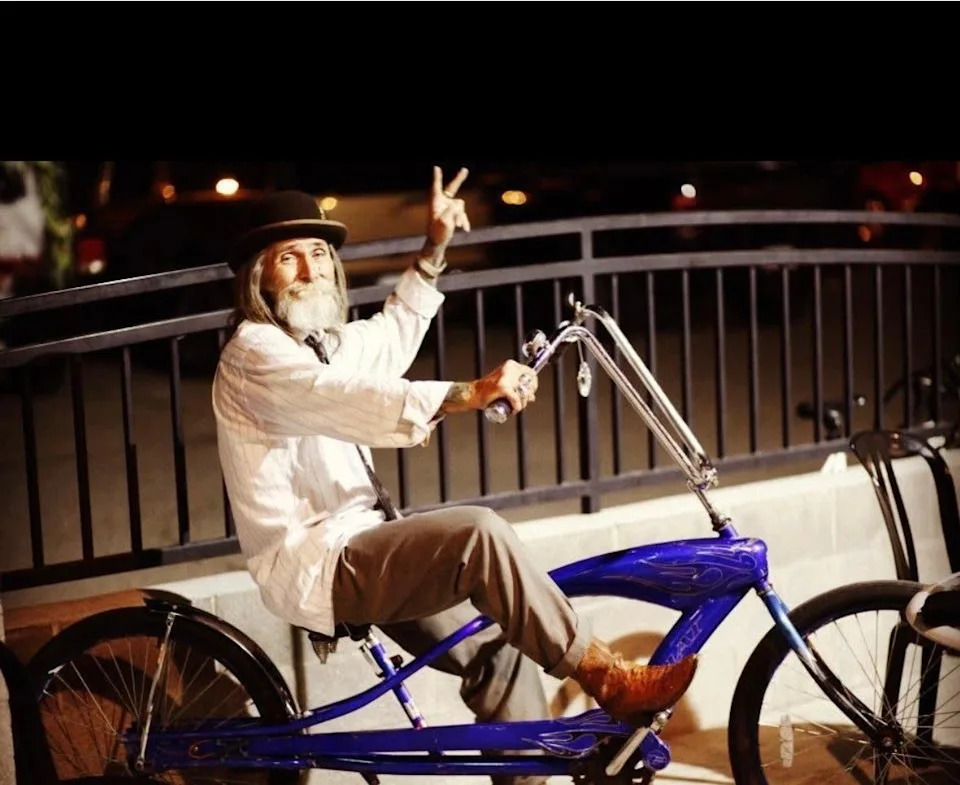 Larry Dee on one of his customized stretch bicycles outside the Rhythm Room in Phoenix.
Larry Dee on one of his customized stretch bicycles outside the Rhythm Room in Phoenix.Dee was always welcome at the Rhythm Room. He didn’t even have to pay the cover charge.
AdvertisementAdvertisement#_R_1brckr8lb2mav5ubsddbH1_ iframe AdvertisementAdvertisement#_R_2brckr8lb2mav5ubsddbH1_ iframeAs Watkins says, “He was on the permanent guest list.”
Dee would roll up on what Corritore describes as “this beautiful customized bicycle.”
A “stretch bicycle” is how Watkins describes it.
“He had the cool bike before cool bikes were cool,” she says. “And for a while there, he used to have a little trailer attached to it and he'd have a good portion of his belongings in there. He was kind of a couch surfer type of a guy. But he always had the coolest bikes.”
One time, when one of those cool bikes got stolen, the Rhythm Room organized a fundraiser.
“And I don't even think we opened the doors for the fundraiser before we already had him a bike,” Watkins says, with a laugh.
AdvertisementAdvertisement#_R_1djckr8lb2mav5ubsddbH1_ iframe AdvertisementAdvertisement#_R_2djckr8lb2mav5ubsddbH1_ iframeThat’s how much he meant to the Rhythm Room family.
Bob Corritore says Larry Dee's dance card was always full
It wasn’t hard to find Dee at the Rhythm Room. You just had to check the dance floor.
Martin Elmers ran the Rack Shack, a barbecue restaurant in the parking lot behind the Rhythm Room, for about 10 years and fronted Corritore the funds to make improvements to the club.
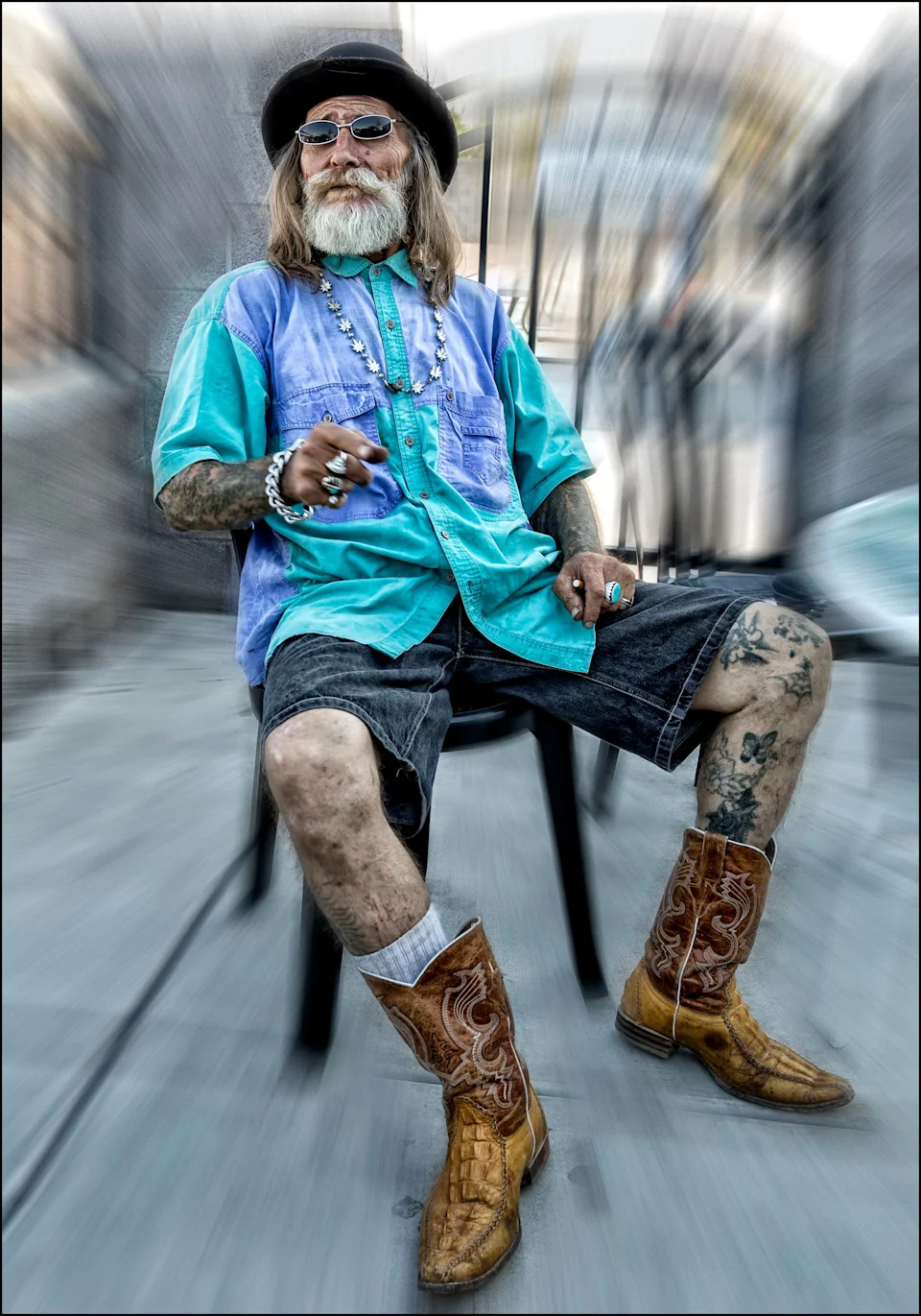 Larry Dee, a Rhythm Room regular who died at 74
Larry Dee, a Rhythm Room regular who died at 74“Larry was always there to dance with any of the single women that wanted to dance,” he says. “And he was just so lovable.”
His dance card, as Corritore says, was always full.
Nina Curri, a local musician, says she met Dee at a blues jam in the early ‘90s, and would often see him on the dance floor.
“He would have a dance with a lot of the gals,” she says. “He was a really great swing dancer. I loved dancing with him. He was my favorite dance partner for all these years. He had some fancy moves. “
Watkins says, “There'd be a few times where I'd go out there with him, and I can tell you that anybody that knew Larry Dee would gladly go out on the dance floor with him, whether you could dance or not, because he made everybody look good.”
Larry Dee was a charmer who often showed up bearing flowers
Dee was also something of a charmer, showing up with flowers from the wholesale florist down the street.
“A wholesale florist can only sell their flowers to the flower shop if they're, like, really fresh,” Watkins says. “A lot of times, they would dump the flowers that were perfectly fine for the average person but not fresh enough for the flower shop. And Larry would go by and check the dumpster.”
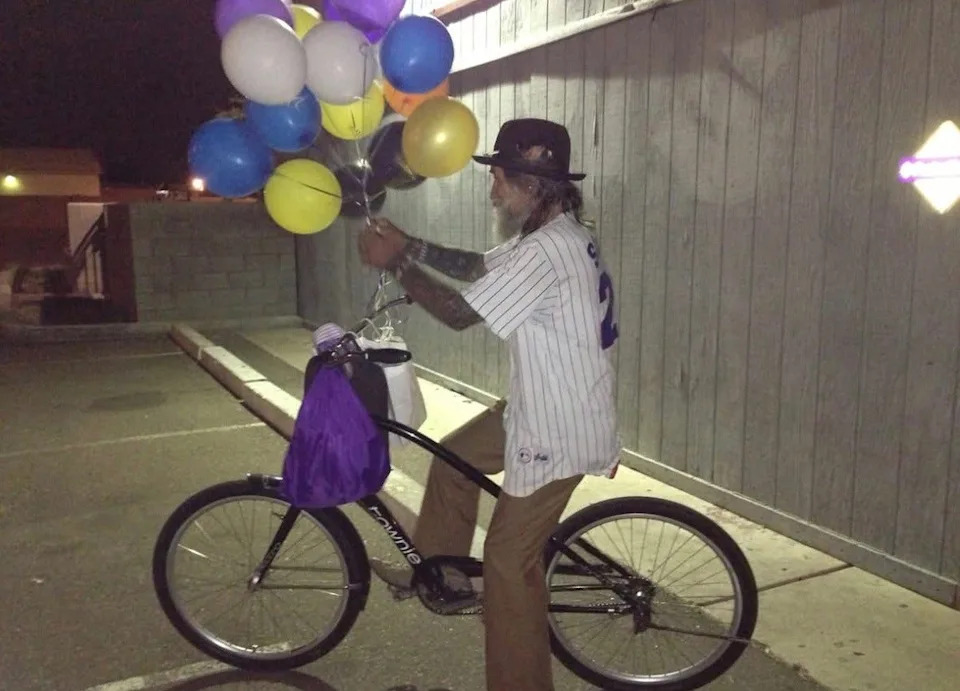 Larry Dee attaches birthday balloons from MonaLisa Watkins to his bicycle outside the Rhythm Room.
Larry Dee attaches birthday balloons from MonaLisa Watkins to his bicycle outside the Rhythm Room.Watkins laughs at the memory.
“He'd come riding up to the Rhythm Room with just a ton of gorgeous flowers and he never let on where he was getting them,” she says.
“Once in a while, they'd look a day old or whatever, but no matter what they looked like, they were always beautiful because they came from him, you know? And he'd say, 'Oh, look what I brought for you, Mona.' Or he'd hand them to one of the cocktail waitresses, or one of the customers. He was such a giving person.”
Curri says, “He had a saying that I just love. He would say ‘Darlin’, seeing you tonight has been the highlight of my evening.’ He just made you feel like you were the most important person he’d seen that day. And it just made me smile. I mean, he said it to all the ladies, right? But I’m sure it made all of us smile. He was a good dude.”
Dee had a 'beautiful, rambunctious style' on harmonica
Dee always carried a harmonica and often found his way onstage.
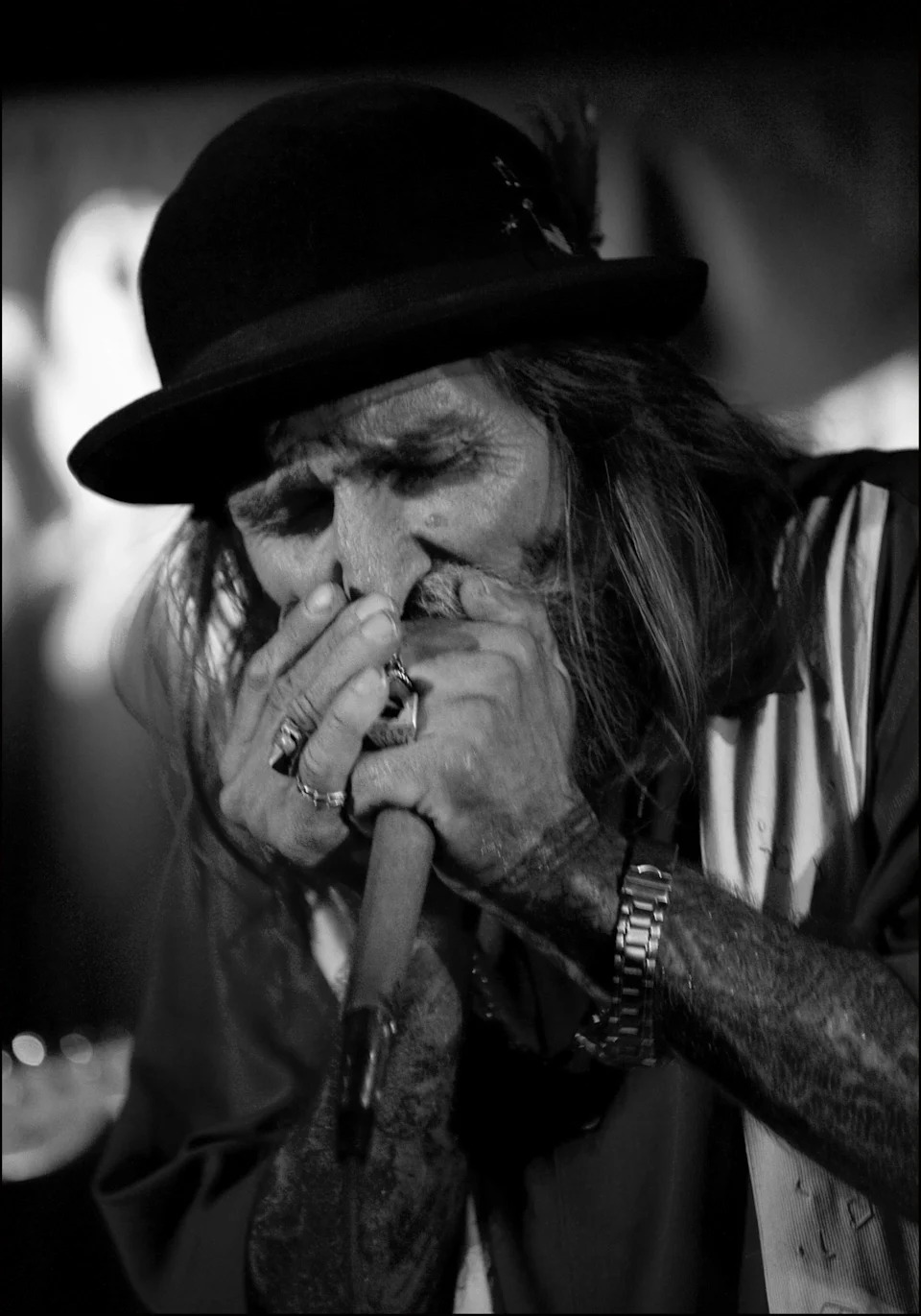 Larry Dee, a Rhythm Room regular who died at 74
Larry Dee, a Rhythm Room regular who died at 74He wasn’t in a band but could’ve been, Corritore says. And Corritore would know. He fronts his band on harmonica.
“Larry was not a real organized person, so maybe it wouldn't have worked out, but when he got up on stage, he had something to say,” Corritore says. “He loved the blues with every part of his being and that came out in his playing. We'd have him play at our annual harmonica show and he'd sit in with people. He had a beautiful, rambunctious style.”
Dee could be quite the entertainer.
“He would get the crowd up dancing,” Curri says. “Before he would play, he’d say, 'Does anyone know what time it is?!' Then he would say, 'It’s blues time' and kick off the song. He was definitely a character. He had a way with people."
A talented tattoo artist whose body was covered in tattoos, Dee painted the Rhythm Room sign.
“Unfortunately, like Larry Dee, the sign is kind of flaking and falling apart, but Larry Dee did the art for that,” Corritore says. “He was like, 'I want to paint your sign.' And there he'd be with the ladder up there, working away.”
'There will never be another Larry Dee'
Dee always had his own thing going on.
“He was his own guy,” Corritore says. “He wore these bowler hats, had real long hair, this big gray beard and this smile of really peaceful joy that made everybody around him feel that same peaceful joy. He was just a cool cat. In a way that was unique. There will never be another Larry Dee.”
He clearly put a lot of thought into his look.
“You see most pictures of him, he's got a hat on, and usually some pretty nice boots and whatever,” Elmers says.
“If you want to talk about fancy clothes, he was probably the best-dressed person in the club a lot of nights. He’d show up with a three-piece suit on and that hat and alligator boots he found at Goodwill. He knew where to shop to get things at good prices.”
Friends from the Rhythm Room visited Dee's care facility
As Dee's health declined, he stopped going to the Rhythm Room.
“After the pandemic, he was dealing with some health issues,” Corritore says. “He couldn't really ride his bicycle anymore. He had a hard time walking. His health started going downhill. He couldn't come to the Rhythm Room, and then we heard that he was in a care center.”
Watkins went to see him.
“He didn't have a lot of energy to talk, but I knew what he would be saying,” Watkins says. “So I sat there and I reminisced with him, because we hadn't seen each other in a while. I told him all the stories that I had of him and the Rhythm Room. I just wanted him to know how I felt about him and how important he was to people.”
She even showed him a movie she made on her phone with pictures of him holding court at the Rhythm Room.
“And he just had this smile on his face that I'll forever be grateful for having been a part of,” Watkins says. “He was a force to be reckoned with, just an amazing creature who brought life to everything and everybody. He was definitely a big part of the Rhythm Room.”
Corritore got a group of friends together to go visit Dee about two weeks before he died, treating their friend to a half-hour concert by Corritore and Jimi "Primetime" Smith.
“Larry really couldn't talk at that point,” Corritore recalls of the last time he saw Dee alive.
“But he smiled. He rolled over in bed and watched. It would've been really hard to talk about anything at that point, so playing just seemed like the way we could communicate. I said, 'Larry, we know you can't come to the Rhythm Room right now, so we thought we'd bring the Rhythm Room to you.'"
It was hard to see him that way, though.
“The way Larry was living at the end was no way to live,” Corritore says. “He was very sick, dealing with diabetes. There were times that he was offered a ride to the Rhythm Room and he still wouldn't come. I think he didn't want people to see him unable to dance and do some of the things that they knew him for. But he'll always be a legend in my mind.”
Dee died a month to the day before his 75th birthday.
"He passed at 4:10 in the morning," Massey says. "And as much as he smoked cannabis? He could’ve waited ‘til 4:20."
Ed has covered pop music for The Republic since 2007, reviewing festivals and concerts, interviewing legends, covering the local scene and more. He did the same in Pittsburgh for more than a decade. Follow him on X and Instagram @edmasley and on Facebook as Ed Masley. Email him at [email protected].
This article originally appeared on Arizona Republic: Phoenix music scene mourns 'a true character,' dead at 74




